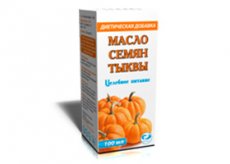Medical expert of the article
New publications
Preparations
Pumpkin seed oil
Last reviewed: 03.07.2025

All iLive content is medically reviewed or fact checked to ensure as much factual accuracy as possible.
We have strict sourcing guidelines and only link to reputable media sites, academic research institutions and, whenever possible, medically peer reviewed studies. Note that the numbers in parentheses ([1], [2], etc.) are clickable links to these studies.
If you feel that any of our content is inaccurate, out-of-date, or otherwise questionable, please select it and press Ctrl + Enter.

Pumpkin seed oil belongs to the group of lipid-lowering drugs.
 [ 1 ]
[ 1 ]
Indications Pumpkin seed oils
It is used to prevent the development of atherosclerosis in the heart and cerebral vessels, as well as hyperlipidemia (forms 2a and 2b). It is also prescribed for combination therapy and prevention of benign prostatic hyperplasia (grades 1 and 2).
Release form
The product is released in the form of oil, in bottles of 50 or 100 ml. There is 1 bottle inside the box.
 [ 2 ]
[ 2 ]
Pharmacodynamics
The medicine contains a whole complex of bioactive components, which are constituent elements of pumpkin seeds (among them are tocopherols with carotenoids, phosphatides and phospholipids, as well as flavonoids, thiamines, riboflavins, bioflavonoids, niacins, vitamins C and F, as well as fatty acids (unsaturated, semi-saturated, and polyunsaturated), including octadecanoic, hexadecanoic, oleic, linoleic and linolenic, as well as arachidonic). They have anti-inflammatory, choleretic, antioxidant, hepatoprotective, and also anti-sclerotic properties.
The element phosphatidylcholine, an activator of the enzyme LCAT, converts free cholesterol into its esters, which do not participate in the development of atherosclerosis. At the same time, this element penetrates into the composition of high-density lipoproteins, helping to accelerate the movement of cholesterol inside the endothelial membrane together with platelets, preventing the aggregation of the latter. In addition, unsaturated fatty acids slow down the absorption of cholesterol and also increase the excretion of fatty acids.
The medicine helps improve the activity of the bile duct, corrects the chemical component of bile, has a weak choleretic effect, weakens inflammations developing inside the epithelium of the biliary system. It also weakens swelling, accelerates the process of epithelialization and helps improve microcirculation, has a protective effect on granulation, and also helps metabolic and trophic processes inside tissues.
The oil has hypotensive properties, suppresses cellular proliferation inside the prostate during the development of benign hyperplasia, and also reduces the severity of inflammation and has a weak bacteriostatic effect.
 [ 3 ]
[ 3 ]
Dosing and administration
The oil is taken orally.
Adults - as a preventive measure against hyperlipidemia, you need to drink 1 teaspoon of oil twice a day. Usually, this course lasts 2 months. Then you need to drink 0.5 teaspoon twice a day. The duration of this course is determined by the course of the pathology and its severity, and on average is 0.5 years.
When treating prostate hyperplasia, you should drink 1 teaspoon twice a day for about 4-5 weeks (on average), and then take 0.5 teaspoon once a day. The duration of therapy is prescribed by the doctor, often it is 5 months.
Use Pumpkin seed oils during pregnancy
There is no information on the effectiveness of the drug and its safety when prescribed to nursing or pregnant women. Therefore, its use during these periods is prohibited.
Contraindications
Main contraindications:
- presence of hypersensitivity to the drug;
- combined use with antacids;
- cholelithiasis;
- pancreatitis;
- childhood, because there is no data on the safety of using drugs in this category of people.
Side effects Pumpkin seed oils
Long-term use of the oil can sometimes cause allergy symptoms or loose stools.
If any side effects occur, you should immediately consult your doctor.
Interactions with other drugs
Shelf life
Attention!
To simplify the perception of information, this instruction for use of the drug "Pumpkin seed oil" translated and presented in a special form on the basis of the official instructions for medical use of the drug. Before use read the annotation that came directly to medicines.
Description provided for informational purposes and is not a guide to self-healing. The need for this drug, the purpose of the treatment regimen, methods and dose of the drug is determined solely by the attending physician. Self-medication is dangerous for your health.

